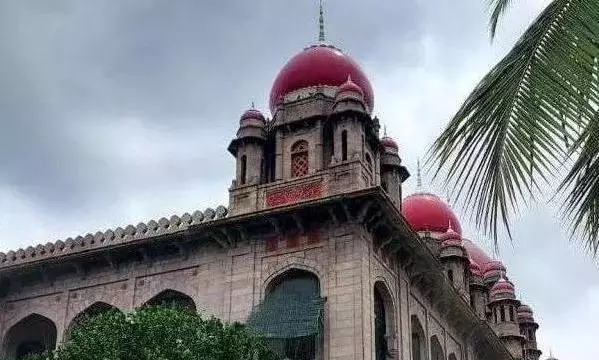Khammam Rama Temple Trustee Appointment Stayed

Hyderabad: Justice N.V. Shravan Kumar of the Telangana High Court passed an interim order directing the state endowments department and other authorities not to appoint a trust board for the Sri Kodandarama Sametha Kalakodeshwara Aalayam situated in Kalakodima, Khammam. This direction came in response to a writ plea filed by the president of the temple trust challenging a notice issued by the authorities for appointing a trust board as per the provisions of The Telangana Charitable And Hindu Religious Institutions And Endowments Act. The petitioner alleged that the impugned notice issued by the respondents was illegal and in violation of the principles of natural justice besides being in violation of the Constitution. The petitioner also sought a direction to the respondent authorities not to appoint any trust board for the temple. After hearing the parties, the judge passed an interim direction and directed the respondents to file their response.
Cement road laying tender under judicial lens
Justice Surepalli Nanda of Telangana High Court took on file a writ plea challenging the grant of a tender in favour of BLG Infra Projects Private Limited for laying of concrete cement roads by Telangana Industrial Infrastructure Corporation (TGIIC). The judge was hearing a writ plea filed by SV Projects alleging that the TGIIC overlooked the fact that the petitioner was a fit candidate to procure the tender, as it held the equipment of Concrete Paver Finisher 40 HP and also filed the registration certificate and lease agreement, as was mentioned as a condition of eligibility for the grant. The grant was for laying of concrete cement roads at IP Gadwal Jogulamba Gadwal district. It is the case of the petitioner that even though BLG Infra Projects Private Limited allegedly did not furnish the required documentation under the eligibility criteria, the tender was granted by TGIIC in its favour in September 2024. After hearing the petitioner, the judge admitted the writ plea and directed the respondent authorities to file their response and posted the matter for further adjudication.
No LOC at bank’s instance: HC
Justice C.V. Bhaskar Reddy of the Telangana High Court quashed a Look Out Circular (LOC) issued at the request of Union Bank of India against the managing director of Progressive Constructions Limited. The judge was dealing with a writ plea filed by Pathuri Praveen. It is the case of the petitioner that Progressive Constructions availed credit facilities from the consortium of banks for which the petitioner stood as guarantor. He contended that the company incurred losses and could not repay the loans, at request the loans was restructured. He alleged that he was stopped by the immigration authorities on the ground that a LOC was issued against him. It was argued that LOC to prevent the petitioner from travelling abroad is arbitrary exercise of power and violative of his fundamental rights. Counsel representing the Centre argued that the Union Bank of India has to recover more than Rs 180 crore together with interest thereon from the borrower and the petitioner as the beneficiary of the bank guarantees has already given the BG invocation letter to the bank. The judge relying on various judgments, ruled that the clause which enunciates the guidelines and framework with regard to issuance of LOC at instance of chairman/managing director/CEOs of all Public Sector Banks was quashed by various High Courts, the LOC issued on that basis is liable to be set aside and cannot be sustained.
Land acquisition for 4-way lane challenged
Justice T. Vinod Kumar of Telangana High Court took on file a writ plea challenging the alleged arbitrary change in the alignment of the proposed four-lane expansion of the Armoor-Jagitial-Mancherial section of National Highway 63. The judge was hearing a writ plea filed by Chedimela Ramesh and 22 others, alleging that the realignment has led to unwarranted acquisition of fertile agricultural lands in Anksapur and Padgal revenue villages, Nizamabad district. The petitioners argued that the change in alignment, is unjustified, as an earlier Section 3A notification dated March 14, 2023, was still in effect. The petitioners also alleged that the new notifications, along with the disposal order issued by the revenue divisional officer-cum-competent authority for land acquisition, violate the provisions of the Act and accordingly sought to set aside the same. The petitioners further contended that the fresh alignment decisions were made without proper justification or authority, driven by extraneous considerations. The petitioners claim that they were unaware of the notifications and were denied an opportunity to raise objections under the Act. The government pleader argued that the change in alignment necessitated fresh notifications, and objections were called for within the stipulated 21-day period, in accordance with law, which the petitioners failed to comply. The judge ordered notices to the respondents and posted the matter for further hearing after two weeks.
Writ against alleged encroachment in Shiv Bagh
Justice B. Vijaysen Reddy of Telangana High Court took on file a writ plea challenging the actions of the SR Nagar Station House officer in not taking any action against an illegal occupant of a property in Shiva Bagh, Ameerpet, Hyderabad. The judge was hearing a writ plea filed by Balaji Estates India Private Limited alleging inaction of the respondent on the complaint of the petitioner pertaining to its property. The petitioner alleged that the respondent is acting in a highly arbitrary manner and in violation of the Constitution. The petitioner also alleged violation of the law laid down by the Supreme Court of India in Lalitha Kumari vs State of Uttar Pradesh. A direction was sought to the respondent for registering an FIR against the accused. The judge after hearing the petitioner, expressed his surprise to the fact that a building was illegally encroached as against a vacant land which is in general illegally occupied in many cases. The judge directed the government pleader representing the respondents to get instructions in the matter.
